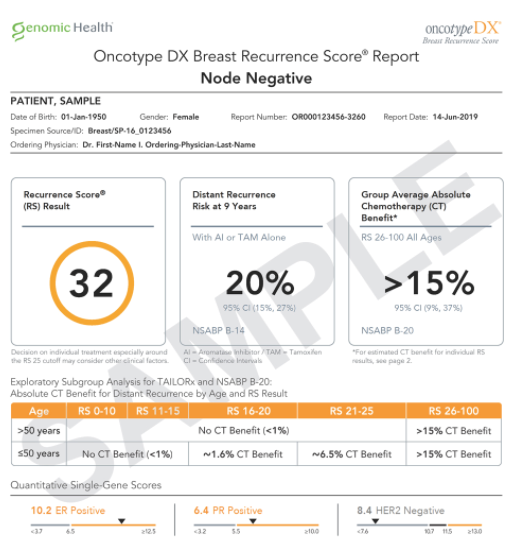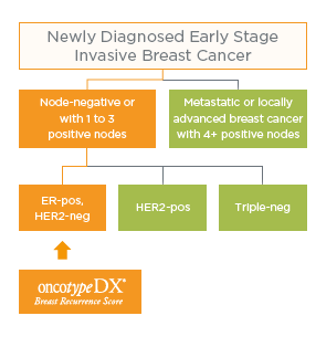Immunohistochemistry & Oncotype Dx
Immunohistochemistry (IHC) is a special staining process that is performed on breast cancer tissue removed during surgery or core biopsy. This process is used to identify if the cancer cells have hormone estrogen or progesterone receptors (ER/PR) and or Her2 receptors on the surface. This is important as it plays a critical role in treatment decisions before surgery or starting chemotherapy.
Hormone Receptor (HR) Status & Hormone Therapy
BC tissue removed during biopsy / surgery will be tested for hormone estrogen (ER) and progesterone receptors (PR) via immunohistochemistry stain (IHC). These female hormones found naturally in women may stimulate cancer growth.
Knowing the hormone receptor status is important in deciding treatment options.
About 75% to 80% of all breast cancers are HR positive.
- HR positive breast cancers tend to grow more slowly, more common in post-menopausal women and can be treated with hormone therapy.
- HR negative breast cancers tend to grow faster and more common in pre-menopausal women.
Hormone therapy medications are anti-oestrogens like Tamoxifen (Nolvadex) and Aromatase inhibitors eg. Femara. Side –effects of hormone treatment: hot flushes, night sweats, mood swings, weight gain and painful joints.
HER2 Positive Breast Cancer
Some women have breast tumors with higher levels of protein known as HER2 therefore called HER2 positive breast cancers. Twenty percent (20%) of breast cancer are HER2 positive indicative of poorer prognosis. However, HER2 positive breast cancers are likely to benefit from treatment with drugs known as Herceptin.
Breast cancer tissue will be tested with immunohistochemistry stain (IHC) to identify the HER2 protein and Fluorescent in-situ hybridization (FISH / SISH test) to guide treatment therapy.
Ki-67
Ki-67 is a proliferation marker used to assess the rate of cell growth. It is a staining process that can measure the percentage of tumor cells that are positive. The more positive the cells are , the more quickly they are dividing and growing new cancer cells.
- Ki67 < 10% - low
- Ki67 10-20% - Borderline
- Ki67 - >20% - High
This additional information together with other parameters will help make treatment decisions.
Oncotype Dx
Oncotype Dx test is a test that analyse the activity of a group of certain genes (21 genes) to determine the cancer’s outcome and predict the risk of breast cancer recurrence.
The test result will show a score (between 0 to 100) to determine the risk level and the need for chemotherapy treatment.
Eg. Low score: can avoid chemotherapy
High score: highly recommended for chemotherapy
General Indications to do the test:
- Early stage Invasive breast cancer (Stage 1 or 2)
- Hormone receptor positive breast cancer (Estrogen Positive BC)
- Axillary node negative BC
- Her2 Negative BC
Relative indication can be considered:
- DCIS (Ductal carcinoma in situ / Stage 0)
- Axillary node involved (less than 3 nodes)
Contraindication
- Triple Negative BC
- Her2 Positive BC
How is it carried out?
The test is done on the breast cancer tumor that is removed during surgery. The tissue is processed in an assigned lab locally before it is sent to the main lab in USA to be carried out.
The results will be ready between 2-3 weeks and will be sent to your requesting doctor respectively.
Understanding Oncotype Dx score for Invasive BC
- The test gives a recurrence score between 0-100
- Using the score results and the rest of other prognostic information of the breast cancer, your specialist will determine and help decide whether chemotherapy would benefit you.
- Simple Example to Understand
|
Sample Report

Source : Oncotype IQ
https://www.oncotypeiq.com/en-US/breast-cancer/healthcare-professionals/oncotype-dx-breast-recurrence-score/interpreting-the-results
ONCOTYPE DX SCORE FOR DCIS
This score determines the risk of recurrence in women diagnosed with DCIS and treated only with lumpectomy.
The score result will predict if the patient needs Radiotherapy treatment after lumpectomy
Indication:
- Breast DCIS
- Lumpectomy / Breast-conserving surgery
- Hormone-receptor positive DCIS
ONCOTYPE DX SCORE FOR NODE POSITIVE INVASIVE BREAST CANCER*
This score determines the risk of breast cancer recurrence in women diagnosed with early stage invasive breast cancer with less than 3 positive nodes.
The score result will predict if the patient will benefit from chemotherapy in selective cases of low risk Invasive breast cancer even with node positive.
Indication:
- Early stage invasive breast cancer
- Hormone receptor positive breast cancer
- Less than 3 axillary nodes positive
- The OncotypeDx recurrence score of node positive invasive breast cancer cases are not well-established and should be thoroughly discussed with your respective surgeon and oncologist .

